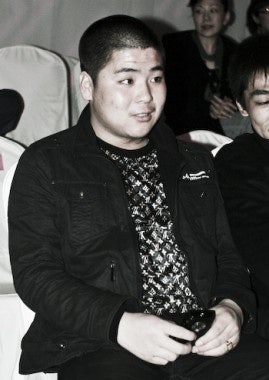"If Everyone Says Lafite Is Good, The Thinking Goes, You Can't Go Wrong By Choosing Lafite"#

With the number of wealthy Chinese growing at an estimated 20 percent per year, the Chinese-language media is rife with mentions of the excesses of the country's bao fa hu (nouveau riche) and xin gui (parvenu). Though these big spenders are becoming a critical market for some of the world's top luxury brands (which have been all too eager to rush into and expand frantically in mainland China over the past several years), as many luxury industry insiders in China have observed, what the nouveau riche has in cash they tend to lack in taste. Recently, one of these insiders, Rupert Hoogewerf, founder of the Hurun Report, spoke to Xinmin about the current state of the Chinese luxury market, and how the nouveau riche are shaping it -- both positively and negatively.
From the interview (translation by Jing Daily team):
Xinmin (XM): You launched your China Rich List in 1999, so you've been dealing with wealthy mainland Chinese for about 12 years now. In your view, what stage are China's wealthy at in terms of brand awareness?#
Rupert Hoogewerf (RH)#
: Well, first, it's important to define China's richest. In 2010, the average age of millionaires in China was only 39, and the average age of billionaires was only 43. The ratio between male to female is 7:3, and they mostly work in real estate and manufacturing. Every year a great deal more people enter this "nouveau riche" class.
The DNA of this "nouveau riche" needs to contain three elements: First, a desire to be recognized. You'll find that these people will participate in a variety of high-end activities, taking great pains to integrate themselves into wealthy social circles. Second is an emphasis on health and self-cultivation. Socially, many will change their drinking habits and turn to red wine, and 60 percent of millionaires in China don't smoke. The third element is showing off their "superiority," so they want to show that they have a better brand knowledge than the average person, in the hopes that they can enjoy better products and services in life.
Admittedly, the luxury awareness levels of China's wealthiest is changing. It used to be that they'd always give cigarettes as gifts, expensive brands like Panda, but now the proportion of cigarettes given in this way has significantly decreased. It used to be that the nouveau riche simply wouldn't choose brands they weren't familiar with, so they figured if they bought the most expensive item available, they couldn't go wrong. So there was no awareness of whether it was suitable or not. Since they had no taste, they were constantly worried that they'd choose the wrong thing and become a laughing stock.
The proportion of this type of nouveau riche is decreasing, but there are still a great number of them. For example, many Chinese people now drink Chateau Lafite. In fact, this brand is not the best red wine. For people who actually understand wine, 1982, 1985, 1986 and 1990 Chateau Lafite is good but other vintages are considered mediocre. But China's got a lot of nouveau riche who enjoy drinking red wine and they'll always gravitate towards Lafite. And those nouveau riche who like the idea of drinking red wine as a lifestyle choice have only a superficial knowledge of wine. They don't know anything about the history or terroir of a particular vintage, or whether it's better to cellar or drink it. Of course, this is to be expected. If people don't put in the work to learn, they'll just blindly conform. If everyone says Lafite is good, the thinking goes, you can't go wrong by choosing Lafite.
But sometimes I'm really impressed by wealthy Chinese. During my 2010 survey, I remember asking a wealthy Chinese man about his interests. He sid he likes red wine, so I casually asked him his favorite brand. He answered "La Tâche." Now, I went to Eton, and this is the first time I'd ever heard of this brand. After I got home and searched around a bit, I learned that La Tâche comes from the Burgundy region of France, and is considered one of the world's best and most expensive wines.

XM: Regarding the differences between wealthy Chinese and those from developed countries, how do attitudes toward luxury differ? It's said that many foreign brands that pass themselves off as luxury in China aren't considered that way at home. So are wealthy Chinese and average Chinese all guilty of "misreading" luxury brands?#
RH#
: Although China's new rich may be wealthy or powerful, they may not have taste. You really can't compare China's nouveau riche with traditional European aristocracy, because the latter has a long history stretching back several generations, while the time in which wealthy Chinese have built their fortunes is very short. So they're still struggling to reconcile and adapt to their new status. In my opinion, the biggest difference between wealthy Chinese and wealthy Europeans is that the former will often give a luxurious gift without understanding the brand, or even liking it, but will spend a great deal of money simply to gain face.
Leaving aside the differences between the "wealthy" and the "nouveau riche" in China, there very few differences in the luxury brands that rich Chinese and rich Westerners like the most. The "misreadings" of brands, as you say, are gradually diminishing. Because of the development of the commercial real estate market, more and more global luxury brands are entering Chinese cities, boosting brand awareness among more people. Also, more people are traveling outside China more than ever, and they know that if a luxury brand is selling in New York, London, or Sydney, then they'll consider buying it too, rather than simply looking at what is selling in Hong Kong.
XM: Last year, total Chinese spending on luxury goods reached US$13 billion, and Goldman Sachs recently reported that China's luxury market share has reached 15 percent, three percent higher than 2009. Yet, at the same time, China seems to be filled with people who consider it embarrassing to carry an LV bag. Some people say that luxury in China is like "screaming in bed" (叫床) -- you don't want to be too loud, but you also don't want nobody to hear you. How do you think luxury brands will balance this dilemma: if too many people are buying luxury goods they risk losing their "noble" status and mystery, yet the brands don't want to sell to a tiny audience?#
RH#
: China's luxury market really has its particularities. The country's economic development happened so quickly that suddenly a large number of consumers who can afford luxury goods were created, and this population is still expanding. Luxury brands must be careful in ensuring that their rapid development [in China] doesn't come at the expense of spreading themselves too thin. Overseas, luxury goods are generally bought by people over the age of 40, so young people won't even consider them. But in China it's different. Whether someone has a lot of money or not, they think that buying luxury goods will give them face. This idea really needs to change.
If someone spends 100 million yuan to join a polo club, and he hears later that the price has been discounted, he'll get angry. If he buys an expensive watch and the price goes down later, he'll be unhappy. Most people choose to buy luxury goods because of their exclusivity and as a hedge. If many people buy it, then there's no choice but to update to the latest and greatest or really just focus on limited-edition products. Currently, not enough focus has been put on this point in China.
On the other hand, luxury brands are putting more emphasis on customer education and training in addition to sales. Over New Year's I heard a radio program teaching people how to drink champagne. Now, many luxury brands in China don't just want to sell you a watch, a piece of jewelry or a sports car, they want to bring you some of the history and culture of their country, bring you new ideas and information. If I want to see what time it is, I can spend 10 yuan on a clock, but if I care about technology, quality, history and culture, I'll spend several hundred thousand yuan on a luxury watch.
Also, and this is interesting, now we're seeing a lot more luxury consumers from China's "rich second generation," many of whom went abroad to study and came back to China with their eyes opened. Maybe their fathers only graduated from primary school and built themselves up from scratch, but the rich second generation is young, well-educated, and very well acquainted with luxury goods. Therefore, the phenomenon of the nouveau riche in China will die down over time, as wealth is transferred to the second and even the third generations. Much like the birth of the European aristocracy, China's luxury market may see a really healthy development.